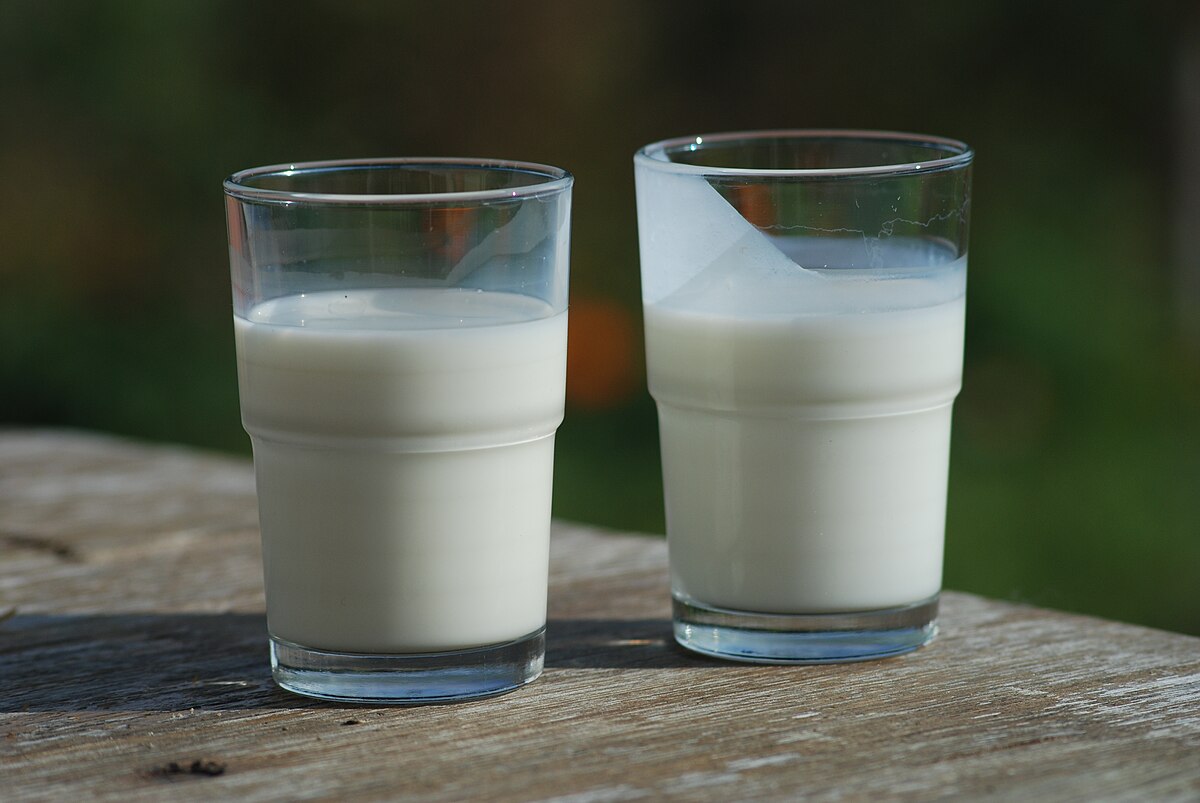
Buttermilk is a beloved dairy product that has been enjoyed for centuries. Its unique tangy flavor and creamy texture make it a versatile ingredient in both sweet and savory dishes. Buttermilk is not only delicious but also offers various health benefits, making it a popular choice among food enthusiasts and health-conscious individuals alike.
In this article, we will explore 18 fascinating facts about buttermilk. From its ancient origins to its culinary uses and nutritional value, we will delve into everything you need to know about this creamy elixir. So grab a glass of refreshing buttermilk and prepare to be amazed by the rich history and diverse qualities of this timeless dairy product.
Key Takeaways:
- Buttermilk is a tangy, low-fat dairy drink packed with nutrients and probiotics. It’s versatile in cooking, tenderizes meat, and can even soothe sunburns. Try it in pancakes or enjoy it on its own!
- You can make buttermilk at home and use it as a substitute for other dairy products. It’s not just a drink, but a key ingredient in cooking, baking, and skincare. Embrace the tangy goodness of buttermilk!
What exactly is buttermilk?
Buttermilk is a fermented dairy drink that is traditionally made by churning butter. It has a tangy taste and a creamy texture, which makes it a popular ingredient in various culinary preparations.
Buttermilk is low in fat and calories.
If you are health-conscious, buttermilk can be a great option for you. It is low in fat and calories, making it a healthier alternative to whole milk or cream.
Buttermilk is rich in nutrients.
This tangy drink is not just low in calories, but also packed with essential nutrients like calcium, potassium, and vitamin BThese nutrients are vital for maintaining healthy bones and promoting nerve function.
Buttermilk is a good source of probiotics.
Probiotics are beneficial bacteria that can improve gut health. Buttermilk contains Lactobacillus and other probiotic strains that can help maintain the balance of bacteria in your digestive system.
You can make buttermilk at home.
If you can’t find buttermilk in stores, don’t worry! You can easily make it at home by adding lemon juice or vinegar to regular milk and allowing it to ferment for a few minutes.
Buttermilk is a versatile ingredient in cooking.
Buttermilk is not just a refreshing drink, but it can also be used as a versatile ingredient in various recipes. It is commonly used in baking, marinades, dressings, and even in fried chicken preparation.
Buttermilk can tenderize meat.
The acidity in buttermilk can help break down the protein fibers in meat, making it more tender and juicy. It is often used as a marinade for chicken, pork, or beef before grilling or roasting.
Buttermilk can be used as a substitute for other dairy products.
If you run out of milk or yogurt while cooking, you can use buttermilk as a substitute. It can add a tangy flavor and creamy texture to your dishes.
Buttermilk can be used in smoothies and shakes.
Looking for a healthy twist to your smoothies and shakes? Add a splash of buttermilk to give your beverage a tangy and creamy kick.
Buttermilk can be used to make homemade ranch dressing.
If you love ranch dressing, you can easily make a healthier version at home using buttermilk, herbs, and other seasonings. It’s a flavorful and creamy alternative to store-bought dressings.
Buttermilk can be enjoyed in various flavors.
Not a fan of plain buttermilk? Don’t worry! You can find flavored buttermilk options like strawberry, chocolate, and vanilla in stores, which can add a delightful twist to your taste buds.
Buttermilk can help soothe sunburns.
The lactic acid in buttermilk has soothing properties that can provide relief to sunburned skin. Simply apply chilled buttermilk to the affected areas for a cooling effect.
Buttermilk can act as a natural exfoliant.
The lactic acid present in buttermilk can help remove dead skin cells, brighten the complexion, and improve the overall texture of your skin. You can use it as a gentle exfoliant by applying it to your face and rinsing it off after a few minutes.
Buttermilk has a long history.
Buttermilk has been consumed and enjoyed for centuries around the world. In many cultures, it holds a significant place in traditional cuisines and is used in various cultural dishes.
Buttermilk can be frozen for later use.
If you have excess buttermilk and don’t want it to go to waste, you can freeze it in ice cube trays. This way, you can easily grab a cube whenever you need it for cooking or baking.
Buttermilk can be used to make fluffy pancakes.
Adding buttermilk to your pancake batter can result in light and fluffy pancakes. The acidity in buttermilk reacts with the leavening agents, creating a tender texture and adding a delightful tang.
Buttermilk can help improve digestion.
Thanks to its probiotic content, buttermilk can aid in digestion and promote a healthy gut. It can help reduce gastrointestinal issues like bloating and constipation.
Buttermilk can be enjoyed on its own.
If you simply love the taste of buttermilk, you can enjoy it chilled or at room temperature, savoring every sip of its tangy goodness.
So there you have it, 18 fascinating facts about buttermilk. Whether you enjoy it as a refreshing drink, use it in cooking and baking, or explore its potential health benefits, buttermilk is truly a versatile and intriguing dairy product.
Try incorporating buttermilk into your culinary adventures and savor the unique flavors and textures it brings to your favorite dishes. Cheers to the joys of buttermilk!
Conclusion
In conclusion, buttermilk is a versatile and nutritious dairy product that has been enjoyed for centuries. Whether you use it in baking, cooking, or as a refreshing drink on its own, buttermilk offers a unique tangy flavor and a creamy texture that enhances any dish. From aiding digestion to providing essential vitamins and minerals, buttermilk offers numerous health benefits. Its high protein content makes it an excellent choice for those looking to maintain or build muscle. Additionally, its probiotic properties contribute to a healthy gut and help boost the immune system.Buttermilk’s versatility extends beyond the kitchen, as it can also be used as a natural beauty remedy for skin and hair care. Its lactic acid content makes it an effective exfoliator and moisturizer, leaving your skin glowing and hydrated.So the next time you come across a recipe that calls for buttermilk, don’t hesitate to give it a try. Embrace the unique taste and reap the many benefits that this delightful dairy product has to offer.
FAQs
1. What is buttermilk?
Buttermilk is a fermented dairy product that is made by churning cream or butter until the fat content separates, leaving behind a liquid known as buttermilk.
2. How is buttermilk different from regular milk?
Buttermilk has a tangy flavor and a thicker consistency compared to regular milk. It also contains probiotics and is lower in fat.
3. Can I use buttermilk as a substitute for regular milk?
Yes, buttermilk can be used as a substitute for regular milk in recipes. However, it may alter the taste and texture of the final dish.
4. Is buttermilk good for digestion?
Yes, buttermilk is known for aiding digestion due to its probiotic content. It helps maintain a healthy gut and can alleviate symptoms of indigestion.
5. Can I make buttermilk at home?
Yes, you can make buttermilk at home by adding a tablespoon of vinegar or lemon juice to a cup of milk and letting it sit for a few minutes until it curdles.
6. Is buttermilk suitable for lactose-intolerant individuals?
Buttermilk contains less lactose than regular milk, making it more tolerable for some lactose-intolerant individuals. However, it is best to consult with a doctor or dietitian for personalized advice.
7. How long does buttermilk last?
When stored properly in a tightly sealed container in the refrigerator, buttermilk can last for about 1-2 weeks.
8. Can I freeze buttermilk?
Yes, buttermilk can be frozen. However, it may separate and change in texture after thawing. It is recommended to shake it well before using.
Buttermilk's versatility extends beyond the kitchen, from cascading waterfalls to celebratory biscuits and creamy dressings. Explore more intriguing facts about this tangy liquid's natural wonders, culinary delights, and nutritional profile in our related articles. Whether you're a nature enthusiast, a baking aficionado, or a health-conscious foodie, there's something to pique your interest and satisfy your curiosity. Join us on this flavorful journey as we unravel the many facets of buttermilk and its surprising connections to the world around us.
Was this page helpful?
Our commitment to delivering trustworthy and engaging content is at the heart of what we do. Each fact on our site is contributed by real users like you, bringing a wealth of diverse insights and information. To ensure the highest standards of accuracy and reliability, our dedicated editors meticulously review each submission. This process guarantees that the facts we share are not only fascinating but also credible. Trust in our commitment to quality and authenticity as you explore and learn with us.


